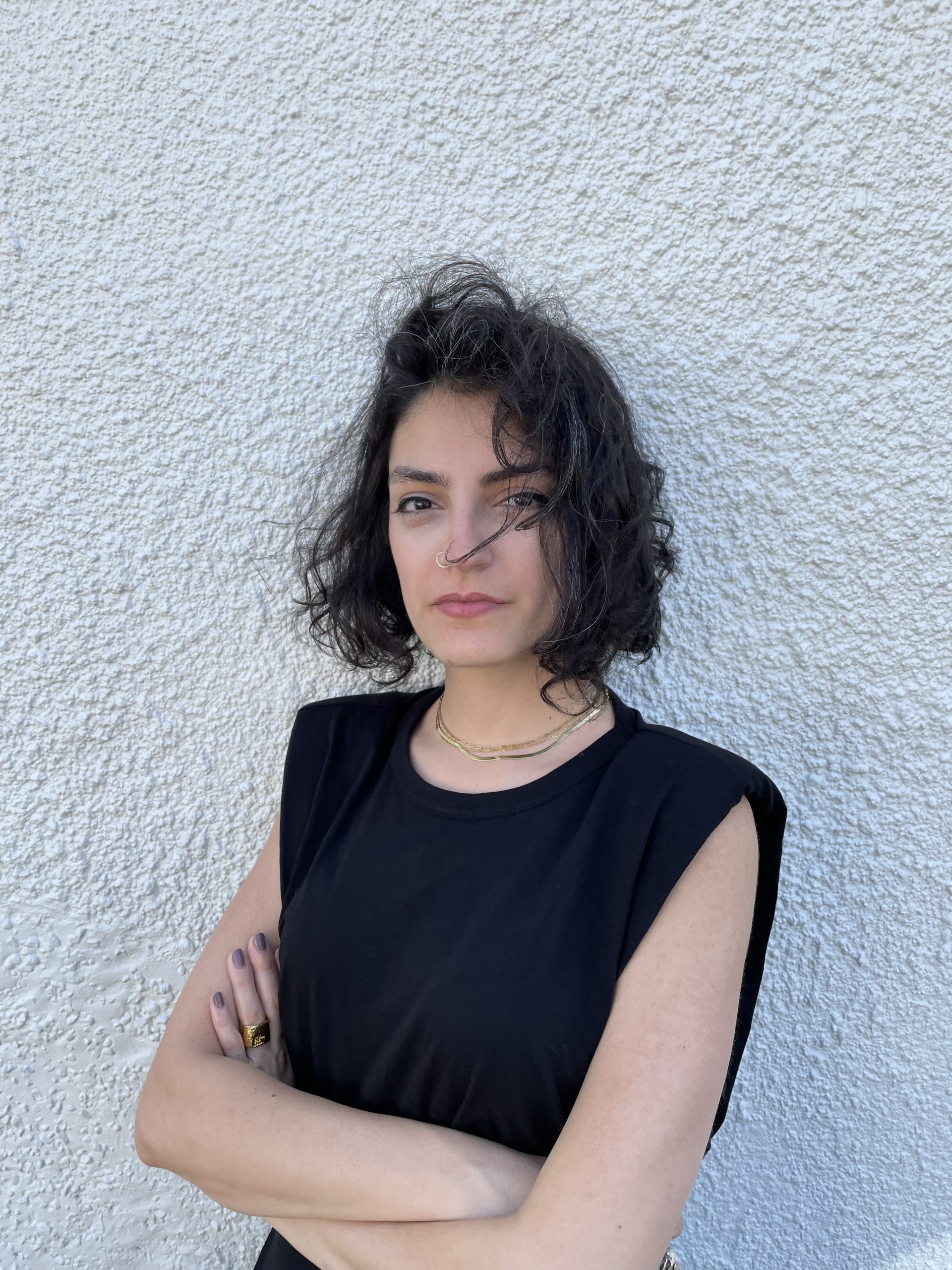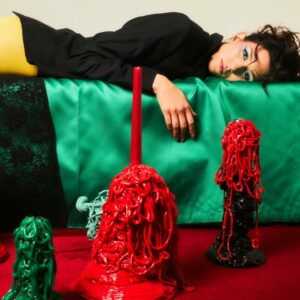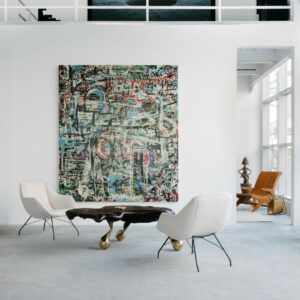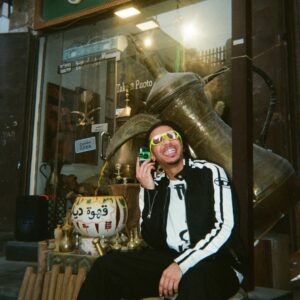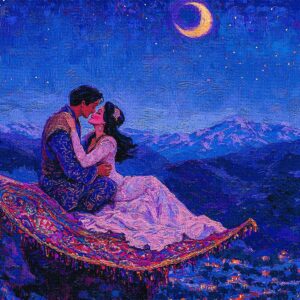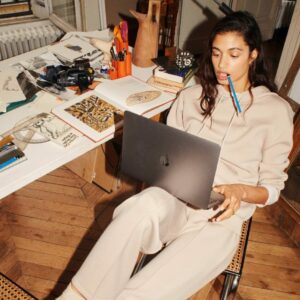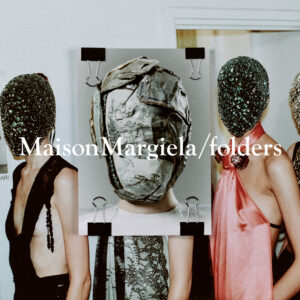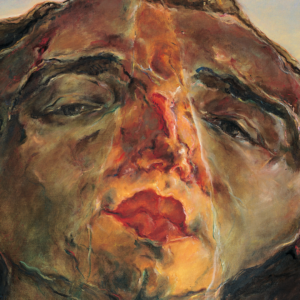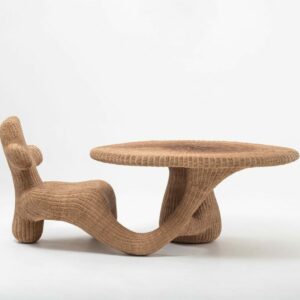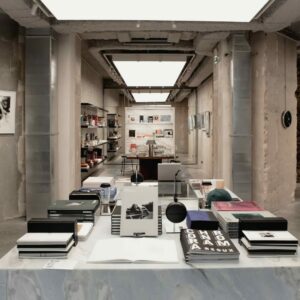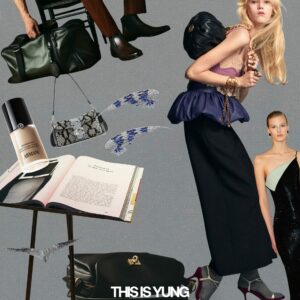British-Lebanese artist Nour Hage spent a decade in the fashion industry between Paris and Beirut. When the pandemic hit, she turned fully towards her art practice, creating textile pieces as well as digital art in the form of NFTs. Nasri Atallah (who happens to be her husband) sat down with Hage at her London studio to discuss her recent V&A Museum fellowship and the things he might not know about her.
Is it weird that I’m interviewing you?
Yes, it is. Because I’ve seen you interview so many people throughout the years. So yeah, it’s weird. But I always thought it could be fun!
Since I know what you’re working on at the moment, let me ask how you are feeling about what you’re working on at the moment?
Actually, right now a bit ‘bleh’. I just stopped working on a piece. It’s been brewing in my head for a while and the outcome is not what I thought it would be. So, I’m slightly scared. But also, not happy.
Scared and not happy. Noted. You just finished your V&A Fellowship. What did it change about you as an artist, a designer, and a human?
I think it gave me confidence in terms of being an artist because it gives legitimacy. That they believe in my work. It’s been nine months, so it was time and space that I was given to figure out how I want to work and what is interesting to me. I realised that my personal life is quite intertwined with my work as an artist.
This is the closest I’ve ever sat to someone I’m interviewing. Am I too close?
[laughter] A bit. It’s weird. I’m trying to answer and you’re just staring at me with crazy eyes.
You gave up your fashion design career to focus on art. I know that having your own clothing brand has been a long-time dream. Do you ever have regrets?
I don’t have regrets. I didn’t really give it up, I just paused. I think what I figured out is that, as much as I love the process of creating and designing clothes, I really don’t like the fashion industry. Part of me wishes I’d figured that out earlier. The pandemic really helped me realise what I care about. Someday I’ll start making clothes again. I just want to find a way that works for me.
What do you get from being an artist that you feel you didn’t get from your decade in fashion?
I think what I also realised recently is that I’ve always been an artist. A big part of me always went into designing collections. Which is not really normal for fashion designers. For some it is, but it’s not the norm. I had more of an artist process than a designer process. Through therapy, I found out that I use my art practice as a way of managing my mental health. Creating art is something that I need to do, as much as something I want to do.
You jumped wholeheartedly into NFTs during the pandemic as well. What do you get from digital art that you don’t get from traditional art spaces?
They function quite differently. It’s not that one is easier than the other. I was so happy when I discovered what NFTs were. I’ve always been interested in digital art, since my days at Parsons, but I never produced any because I was scared of how easy it was to copy. And I think that’s why it had never been valued the way it is now because there was no way to create authenticity around your art.
By value do you mean its attribution or its monetary value?
Attribution. It’s attached to its creator. But automatically when it’s attached to its creator you have a monetary value that comes from that. The way it does in the physical art world, with provenance. There’s so much potential in digital art as a medium – in what can be done. Whether it’s AI, the digital skills you have or even coding that allows you to explore ways of changing a piece over time. That’s very playful.
It feels like physical art is almost sacred and digital art, because it’s informed by online culture, is more playful in its DNA
I’m very serious about my digital art! But yeah, a lot of it is playful. Lightness in art speaks to people. The thing that struck me the most in the NFT space is the sense of community. I got to meet so many interesting people digitally, and some in real life and they became friends. They’re people I would never have met otherwise.
How did the move from Beirut to London years ago change how you see your work?
London gave me space to discover what I’m interested in. Being outside the Middle East gave me space to reconnect with my roots. The outside view into my culture. It’s like when you keep a healthy distance from somebody, it makes it a healthier relationship. I feel I needed these years to understand how I wanted to be Arab, Middle Eastern, Lebanese. I found a community of Arabs in London seeking the same thing.
I don’t think I’ve ever asked you this, but who you would say are your inspirations as an artist?
The artists that inspire me don’t necessarily inspire me aesthetically. It’s more their process or the new ways they created art. People like Mona Hatoum, Olafur Eliasson, Annette Messager. And more recently, artists like Emily Xie, Jason Seife, or Osinachi.
What’s the most annoying thing I do?
[laughs] It depends. It goes in phases. I remember the phase where you’d poke my arm when you were talking, and I wasn’t listening.
I was hoping the answer to that question would be ‘nothing’. More seriously, is there something I don’t know about you?
[long pause] Yes.
I’m not sure what to ask next
Can I ask you a question? What do you think about my artwork? What words pop into your head?
Lived in. I feel your pieces are lived in, almost organic. Does that make sense?
It’s funny you say that. I had a conversation with my therapist about my work yesterday. She asked if I’d rather see my work in a museum or someone’s house. I knew the answer straight away but never thought about it before. When it comes down to the real meaning of my art, I like the idea of my art being in a home and living with someone every day.
